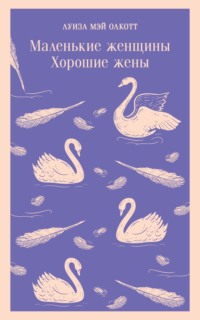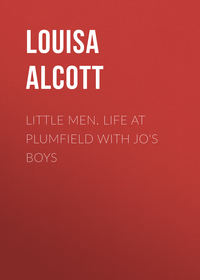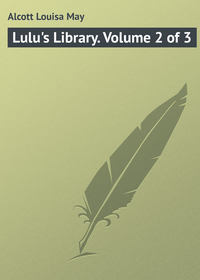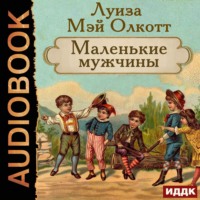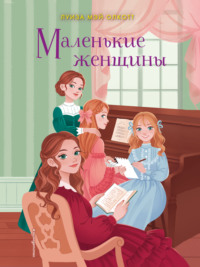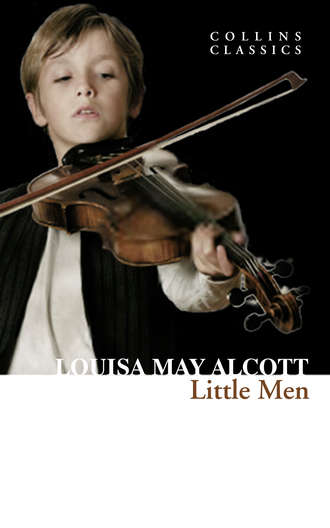
Полная версия
Little Men: Life at Plumfield with Jo’s Boys
Mrs. Bhaer strengthened his health by every aid she could invent, and the boys all pitied and were kind to him. He did not like their active plays, but would sit for hours watching the doves, would dig holes for Teddy till even that ardent grubber was satisfied, or follow Silas, the man, from place to place seeing him work, for honest Si was very good to him, and though he forgot his letters Billy remembered friendly faces.
Tommy Bangs was the scapegrace of the school, and the most trying scapegrace that ever lived. As full of mischief as a monkey, yet so good-hearted that one could not help forgiving his tricks; so scatter-brained that words went by him like the wind, yet so penitent for every misdeed, that it was impossible to keep sober when he vowed tremendous vows of reformation, or proposed all sorts of queer punishments to be inflicted upon himself. Mr. and Mrs. Bhaer lived in a state of preparation for any mishap, from the breaking of Tommy’s own neck, to the blowing up of the entire family with gunpowder; and Nursey had a particular drawer in which she kept bandages, plasters, and salves for his especial use, for Tommy was always being brought in half dead; but nothing ever killed him, and he arose from every downfall with redoubled vigor.
The first day he came, he chopped the top off one finger in the hay-cutter, and during the week, fell from the shed roof, was chased by an angry hen who tried to pick his out because he examined her chickens, got run away with, and had his ears boxed violent by Asia, who caught him luxuriously skimming a pan of cream with half a stolen pie. Undaunted, however, by any failures or rebuffs, this indomitable youth went on amusing himself with all sorts of tricks till no one felt safe. If he did not know his lessons, he always had some droll excuse to offer, and as he was usually clever at his books, and as bright as a button in composing answers when he did not know them, he go on pretty well at school. But out of school, Ye gods and little fishes! how Tommy did carouse!
He wound fat Asia up in her own clothes line against the post, and left here there to fume and scold for half an hour one busy Monday morning. He dropped a hot cent down Mary Ann’s back as that pretty maid was waiting at table one day when there were gentlemen to dinner, whereat the poor girl upset the soup and rushed out of the room in dismay, leaving the family to think that she had gone mad. He fixed a pail of water up in a tree, with a bit of ribbon fastened to the handle, and when Daisy, attracted by the gay streamer, tried to pull it down, she got a douche bath that spoiled her clean frock and hurt her little feelings very much. He put rough white pebbles in the sugar-bowl when his grandmother came to tea, and the poor old lady wondered why they didn’t melt in her cup, but was too polite to say anything. He passed around snuff in church so that five of the boys sneezed with such violence they had to go out. He dug paths in winter time, and then privately watered them so that people should tumble down. He drove poor Silas nearly wild by hanging his big boots in conspicuous places, for his feet were enormous, and he was very much ashamed of them. He persuaded confiding little Dolly to tie a thread to one of his loose teeth, and leave the string hanging from his mouth when he went to sleep, so that Tommy could pull it out without his feeling the dreaded operation. But the tooth wouldn’t come at the first tweak, and poor Dolly woke up in great anguish of spirit, and lost all faith in Tommy from that day forth.
The last prank had been to give the hens bread soaked in rum, which made them tipsy and scandalized all the other fowls, for the respectable old biddies went staggering about, pecking and clucking in the most maudlin manner, while the family were convulsed with laughter at their antics, till Daisy took pity on them and shut them up in the hen-house to sleep off their intoxication.
These were the boys and they lived together as happy as twelve lads could, studying and playing, working and squabbling, fighting faults and cultivating virtues in the good old-fashioned way. Boys at other schools probably learned more from books, but less of that better wisdom which makes good men. Latin, Greek, and mathematics were all very well, but in Professor Bhaer’s opinion, self knowledge, self-help, and self-control were more important, and he tried to teach them carefully. People shook their heads sometimes at his ideas, even while they owned that the boys improved wonderfully in manners and morals. But then, as Mrs. Jo said to Nat, “it was an odd school.”
CHAPTER 3
Sunday
The moment the bell rang next morning Nat flew out of bed, and dressed himself with great satisfaction in the suit of clothes he found on the chair. They were not new, being half-worn garments of one of the well-to-do boys; but Mrs. Bhaer kept all such cast-off feathers for the picked robins who strayed into her nest. They were hardly on when Tommy appeared in a high state of clean collar, and escorted Nat down to breakfast.
The sun was shining into the dining-room on the well-spread table, and the flock of hungry, hearty lads who gathered round it. Nat observed that they were much more orderly than they had been the night before, and every one stood silently behind his chair while little Rob, standing beside his father at the head of the table, folded his hands, reverently bent his curly head, and softly repeated a short grace in the devout German fashion, which Mr. Bhaer loved and taught his little son to honor. Then they all sat down to enjoy the Sunday-morning breakfast of coffee, steak, and baked potatoes, instead of the bread and milk fare with which they usually satisfied their young appetites. There was much pleasant talk while the knives and forks rattled briskly, for certain Sunday lessons were to be learned, the Sunday walk settled, and plans for the week discussed. As he listened, Nat thought it seemed as if this day must be a very pleasant one, for he loved quiet, and there was a cheerful sort of hush over every thing that pleased him very much; because, in spite of his rough life, the boy possessed the sensitive nerves which belong to a music-loving nature.
“Now, my lads, get your morning jobs done, and let me find you ready for church when the ’bus comes round,” said Father Bhaer, and set the example by going into the school-room to get books ready for the morrow.
Every one scattered to his or her task, for each had some little daily duty, and was expected to perform it faithfully. Some brought wood and water, brushed the steps, or ran errands for Mrs. Bhaer. Others fed the pet animals, and did chores about the barn with Franz. Daisy washed the cups, and Demi wiped them, for the twins liked to work together, and Demi had been taught to make himself useful in the little house at home. Even Baby Teddy had his small job to do, and trotted to and fro, putting napkins away, and pushing chairs into their places. For half and hour the lads buzzed about like a hive of bees, then the ’bus drove round, Father Bhaer and Franz with the eight older boys piled in, and away they went for a three-mile drive to church in town.
Because of the troublesome cough Nat prefered to stay at home with the four small boys, and spent a happy morning in Mrs. Bhaer’s room, listening to the stories she read them, learning the hymns she taught them, and then quietly employing himself pasting pictures into an old ledger.
“This is my Sunday closet,” she said, showing him shelves filled with picture-books, paint-boxes, architectural blocks, little diaries, and materials for letter-writing. “I want my boys to love Sunday, to find it a peaceful, pleasant day, when they can rest from common study and play, yet enjoy quiet pleasures, and learn, in simple ways, lessons more important than any taught in school. Do you understand me?” she asked, watching Nat’s attentive face.
“You mean to be good?” he said, after hesitating a minute.
“Yes; to be good, and to love to be good. It is hard work sometimes, I know very well; but we all help one another, and so we get on. This is one of the ways in which I try to help my boys,” and she took down a thick book, which seemed half-full of writing, and opened at a page on which there was one word at the top.
“Why, that’s my name!” cried Nat, looking both surprised and interested.
“Yes; I have a page for each boy. I keep a little account of how he gets on through the week, and Sunday night I show him the record. If it is bad I am sorry and disappointed, if it is good I am glad and proud; but, whichever it is, the boys know I want to help them, and they try to do their best for love of me and Father Bhaer.”
“I should think they would,” said Nat, catching a glimpse of Tommy’s name opposite his own, and wondering what was written under it.
Mrs. Bhaer saw his eye on the words, and shook her head, saying, as she turned a leaf:
“No, I don’t show my records to any but the one to whom each belongs. I call this my conscience book; and only you and I will ever know what is to be written on the page below your name. Whether you will be pleased or ashamed to read it next Sunday depends on yourself. I think it will be a good report; at any rate, I shall try to make things easy for you in this new place, and shall be quite contented if you keep our few rules, live happily with the boys, and learn something.”
“I’ll try ma’am;” and Nat’s thin face flushed up with the earnestness of his desire to make Mrs. Bhaer “glad and proud,” not “sorry and disappointed.” “It must be a great deal of trouble to write about so many,” he added, as she shut her book with an encouraging pat on the shoulder.
“Not to me, for I really don’t know which I like best, writing or boys,” she said, laughing to see Nat stare with astonishment at the last item. “Yes, I know many people think boys are a nuisance, but that is because they don’t understand them. I do; and I never saw the boy yet whom I could not get on capitally with after I had once found the soft spot in his heart. Bless me, I couldn’t get on at all without my flock of dear, noisy, naughty, harum-scarum little lads, could I, my Teddy?” and Mrs. Bhaer hugged the young rogue, just in time to save the big inkstand from going into his pocket.
Nat, who had never heard anything like this before, really did not know whether Mother Bhaer was a trifle crazy, or the most delightful woman he had ever met. He rather inclined to the latter opinion, in spite of her peculiar tastes, for she had a way of filling up a fellow’s plate before he asked, of laughing at his jokes, gently tweaking him by the ear, or clapping him on the shoulder, that Nat found very engaging.
“Now, I think you would like to go into the school-room and practise some of the hymns we are to sing to-night,” she said, rightly guessing the thing of all others that he wanted to do.
Alone with the beloved violin and the music-book propped up before him in the sunny window, while Spring beauty filled the world outside, and Sabbath silence reigned within, Nat enjoyed an hour or two of genuine happiness, learning the sweet old tunes, and forgetting the hard past in the cheerful present.
When the church-goers came back and dinner was over, every one read, wrote letters home, said their Sunday lessons, or talked quietly to one another, sitting here and there about the house. At three o’clock the entire family turned out to walk, for all the active young bodies must have exercise; and in these walks the active young minds were taught to see and love the providence of God in the beautiful miracles which Nature was working before their eyes. Mr. Bhaer always went with them, and in his simple, fatherly way, found for his flock, “Sermons in stones, books in the running brooks, and good in everything.”
Mrs. Bhaer with Daisy and her own two boys drove into town, to pay the weekly visit to Grandma, which was busy Mother Bhaer’s one holiday and greatest pleasure. Nat was not strong enough for the long walk, and asked to stay at home with Tommy, who kindly offered to do the honors of Plumfield. “You’ve seen the house, so come out and have a look at the garden, and the barn, and the menagerie,” said Tommy, when they were left alone with Asia, to see that they didn’t get into mischief; for, though Tommy was one of the best-meaning boys who ever adorned knickerbockers, accidents of the most direful nature were always happening to him, no one could exactly tell how.
“What is your menagerie?” asked Nat, as they trotted along the drive that encircled the house.
“We all have pets, you see, and we keep ’em in the corn-barn, and call it the menagerie. Here you are. Isn’t my guinea-pig a beauty?” and Tommy proudly presented one of the ugliest specimens of that pleasing animal that Nat ever saw.
“I know a boy with a dozen of ’em, and he said he’d give me one, only I hadn’t any place to keep it, so I couldn’t have it. It was white, with black spots, a regular rouser, and maybe I could get it for you if you’d like it,” said Nat, feeling it would be a delicate return for Tommy’s attentions.
“I’d like it ever so much, and I’ll give you this one, and they can live together if they don’t fight. Those white mice are Rob’s, Franz gave ’em to him. The rabbits are Ned’s, and the bantams outside are Stuffy’s. That box thing is Demi’s turtle-tank, only he hasn’t begun to get ’em yet. Last year he had sixty-two, whackers some of ’em. He stamped one of ’em with his name and the year, and let it go; and he says maybe he will find it ever so long after and know it. He read about a turtle being found that had a mark on it that showed it must be hundreds of years old. Demi’s such a funny chap.”
“What is in this box?” asked Nat, stopping before a large deep one, half-full of earth.
“Oh, that’s Jack Ford’s worm-shop. He digs heaps of ’em and keeps ’em here, and when we want any to go afishing with, we buy some of him. It saves lots of trouble, only he charged too much for ’em. Why, last time we traded I had to pay two cents a dozen, and then got little ones. Jack’s mean sometimes, and I told him I’d dig for myself if he didn’t lower his prices. Now, I own two hens, those gray ones with top knots, first-rate ones they are too, and I sell Mrs. Bhaer the eggs, but I never ask her more than twenty-five cents a dozen, never! I’d be ashamed to do it,” cried Tommy, with a glance of scorn at the worm-shop.
“Who owns the dogs?” asked Nat, much interested in these commercial transactions, and feeling that T. Bangs was a man whom it would be a privilege and a pleasure to patronize.
“The big dog is Emil’s. His name is Christopher Columbus. Mrs. Bhaer named him because she likes to say Christopher Columbus, and no one minds it if she means the dog,” answered Tommy, in the tone of a show-man displaying his menagerie. “The white pup is Rob’s, and the yellow one is Teddy’s. A man was going to drown them in our pond, and Pa Bhaer wouldn’t let him. They do well enough for the little chaps, I don’t think much of ’em myself. Their names are Castor and Pollux.”
“I’d like Toby the donkey best, if I could have anything, it’s so nice to ride, and he’s so little and good,” said Nat, remembering the weary tramps he had taken on his own tired feet.
“Mr. Laurie sent him out to Mrs. Bhaer, so she shouldn’t carry Teddy on her back when we go to walk. We’re all fond of Toby, and he’s a first-rate donkey, sir. Those pigeons belong to the whole lot of us, we each have our pet one, and go shares in all the little ones as they come along. Squabs are great fun; there ain’t any now, but you can go up and take a look at the old fellows, while I see if Cockletop and Granny have laid any eggs.”
Nat climbed up a ladder, put his head through a trap door and took a long look at the pretty doves billing and cooing in their spacious loft. Some on their nests, some bustling in and out, and some sitting at their doors, while many went flying from the sunny housetop to the straw-strewn farmyard, where six sleek cows were placidly ruminating.
“Everybody has got something but me. I wish I had a dove, or a hen, or even a turtle, all my own,” thought Nat, feeling very poor as he saw the interesting treasures of the other boys. “How do you get these things?” he asked, when he joined Tommy in the barn.
“We find ’em or buy ’em, or folks give ’em to us. My father sends me mine; but as soon as I get egg money enough, I’m going to buy a pair of ducks. There’s a nice little pond for ’em behind the barn, and people pay well for duck-eggs, and the little duckies are pretty, and it’s fun to see ’em swim,” said Tommy, with the air of a millionaire.
Nat sighed, for he had neither father nor money, nothing in the wide world but an old empty pocketbook, and the skill that lay in his ten finger tips. Tommy seemed to understand the question and the sigh which followed his answer, for after a moment of deep thought, he suddenly broke out,
“Look here, I’ll tell you what I’ll do. If you will hunt eggs for me, I hate it, I’ll give you one egg out of every dozen. You keep account, and when you’ve had twelve, Mother Bhaer will give you twenty-five cents for ’em, and then you can buy what you like, don’t you see?”
“I’ll do it! What a kind feller you are, Tommy!” cried Nat, quite dazzled by this brilliant offer.
“Pooh! that is not anything. You begin now and rummage the barn, and I’ll wait here for you. Granny is cackling, so you’re sure to find one somewhere,” and Tommy threw himself down on the hay with a luxurious sense of having made a good bargain, and done a friendly thing.
Nat joyfully began his search, and went rustling from loft to loft till he found two fine eggs, one hidden under a beam, and the other in an old peck measure, which Mrs. Cockletop had appropriated.
“You may have one and I’ll have the other, that will just make up my last dozen, and to-morrow we’ll start fresh. Here, you chalk your accounts up near mine, and then we’ll be all straight,” said Tommy, showing a row of mysterious figures on the side of an old winnowing machine.
With a delightful sense of importance, the proud possessor of one egg opened his account with his friend, who laughingly wrote above the figures these imposing words,
“T. Bangs & Co.”
Poor Nat found them so fascinating that he was with difficulty persuaded to go and deposit his first piece of portable property in Asia’s store-room. Then they went on again, and having made the acquaintance of the two horses, six cows, three pigs, and one Alderney “Bossy,” as calves are called in New England, Tommy took Nat to a certain old willow-tree that overhung a noisy little brook. From the fence it was an easy scramble into a wide niche between the three big branches, which had been cut off to send out from year to year a crowd of slender twigs, till a green canopy rustled overhead. Here little seats had been fixed, and a hollow place a closet made big enough to hold a book or two, a dismantled boat, and several half-finished whistles.
“This is Demi’s and my private place; we made it, and nobody can come up unless we let ’em, except Daisy, we don’t mind her,” said Tommy, as Nat looked with delight from the babbling brown water below to the green arch above, where bees were making a musical murmur as they feasted on the long yellow blossoms that filled the air with sweetness.
“Oh, it’s just beautiful!” cried Nat. “I do hope you’ll let me up sometimes. I never saw such a nice place in all my life. I’d like to be a bird, and live here always.”
“It is pretty nice. You can come if Demi don’t mind, and I guess he won’t, because he said last night that he liked you.”
“Did he?” and Nat smiled with pleasure, for Demi’s regard seemed to be valued by all the boys, partly because he was Father Bhaer’s nephew, and partly because he was such a sober, conscientious little fellow.
“Yes; Demi likes quiet chaps, and I guess he and you will get on if you care about reading as he does.”
Poor Nat’s flush of pleasure deepened to a painful scarlet at those last words, and he stammered out,
“I can’t read very well; I never had any time; I was always fiddling round, you know.”
“I don’t love it myself, but I can do it well enough when I want to,” said Tommy, after a surprised look, which said as plainly as words, “A boy twelve years old and can’t read!”
“I can read music, anyway,” added Nat, rather ruffled at having to confess his ignorance.
“I can’t,” and Tommy spoke in a respectful tone, which emboldened Nat to say firmly,
“I mean to study real hard and learn every thing I can, for I never had a chance before. Does Mr. Bhaer give hard lessons?”
“No; he isn’t a bit cross; he sort of explains and gives you a boost over the hard places. Some folks don’t; my other master didn’t. If we missed a word, didn’t we get raps on the head!” and Tommy rubbed his own pate as if it tingled yet with the liberal supply of raps, the memory of which was the only thing he brought away after a year with his “other master.”
“I think I could read this,” said Nat, who had been examining the books.
“Read a bit, then; I’ll help you,” resumed Tommy, with a patronizing air.
So Nat did his best, and floundered through a page with may friendly “boosts” from Tommy, who told him he would soon “go it” as well as anybody. Then they sat and talked boy-fashion about all sorts of things, among others, gardening; for Nat, looking down from his perch, asked what was planted in the many little patches lying below them on the other side of the brook.
“These are our farms,” said Tommy. “We each have our own patch, and raise what we like in it, only have to choose different things, and can’t change till the crop is in, and we must keep it in order all summer.”
“What are you going to raise this year?”
“Wal, I cattleated to hev beans, as they are about the easiest crop a-goin’.”
Nat could not help laughing, for Tommy had pushed back his hat, put his hands in his pockets, and drawled out his words in unconscious imitation of Silas, the man who managed the place for Mr. Bhaer.
“Come, you needn’t laugh; beans are ever so much easier than corn or potatoes. I tried melons last year, but the bugs were a bother, and the old things wouldn’t get ripe before the frost, so I didn’t have but one good water and two little ‘mush mellions,’” said Tommy, relapsing into a “Silasism” with the last word.
“Corn looks pretty growing,” said Nat, politely, to atone for his laugh.
“Yes, but you have to hoe it over and over again. Now, six weeks’ beans only have to be done once or so, and they get ripe soon. I’m going to try ’em, for I spoke first. Stuffy wanted ’em, but he’s got to take peas; they only have to be picked, and he ought to do it, he eats such a lot.”
“I wonder if I shall have a garden?” said Nat, thinking that even corn-hoeing must be pleasant work.
“Of course you will,” said a voice from below, and there was Mr. Bhaer returned from his walk, and come to find them, for he managed to have a little talk with every one of the lads some time during the day, and found that these chats gave them a good start for the coming week.
Sympathy is a sweet thing, and it worked wonders here, for each boy knew that Father Bhaer was interested in him, and some were readier to open their hearts to him than to a woman, especially the older ones, who liked to talk over their hopes and plans, man to man. When sick or in trouble they instinctively turned to Mrs. Jo, while the little ones made her their mother-confessor on all occasions.
In descending from their nest, Tommy fell into the brook; being used to it, he calmly picked himself out and retired to the house to be dried. This left Nat to Mr. Bhaer, which was just what he wished, and, during the stroll they took among the garden plots, he won the lad’s heart by giving him a little “farm,” and discussing crops with him as gravely as if the food for the family depended on the harvest. From this pleasant topic they went to others, and Nat had many new and helpful thoughts put into a mind that received them as gratefully as the thirsty earth had received the warm spring rain. All supper time he brooded over them, often fixing his eyes on Mr. Bhaer with an inquiring look, that seemed to say, “I like that, do it again, sir.” I don’t know whether the man understood the child’s mute language or not, but when the boys were all gathered together in Mrs. Bhaer’s parlor for the Sunday evening talk, he chose a subject which might have been suggested by the walk in the garden.



